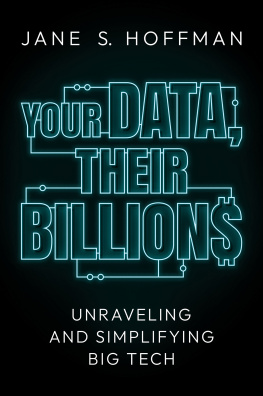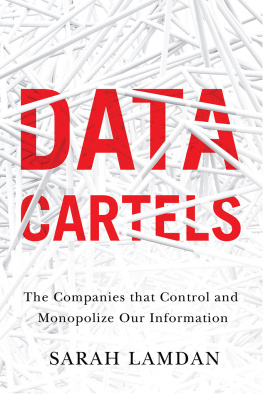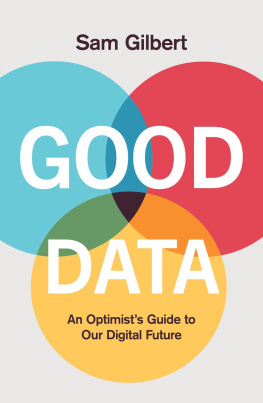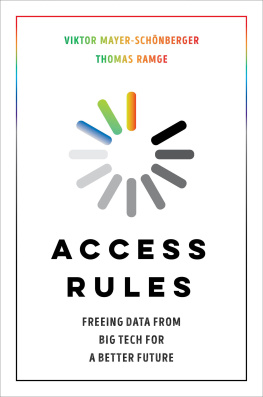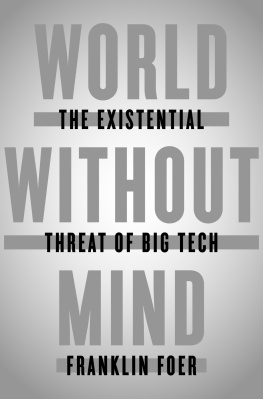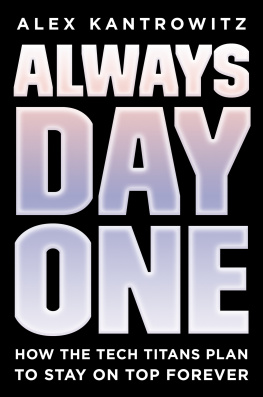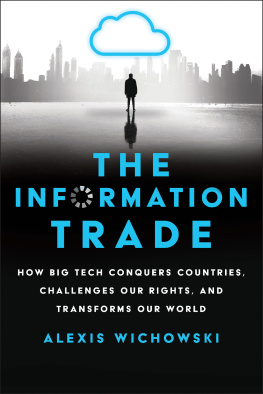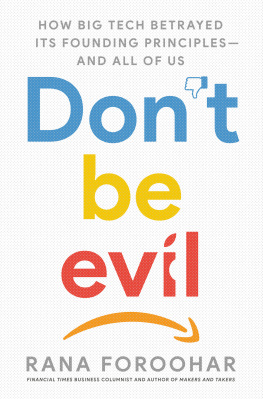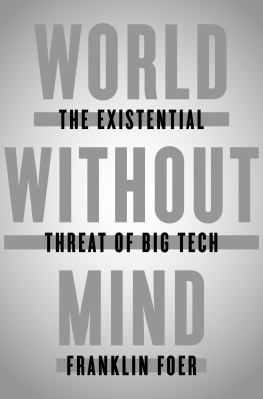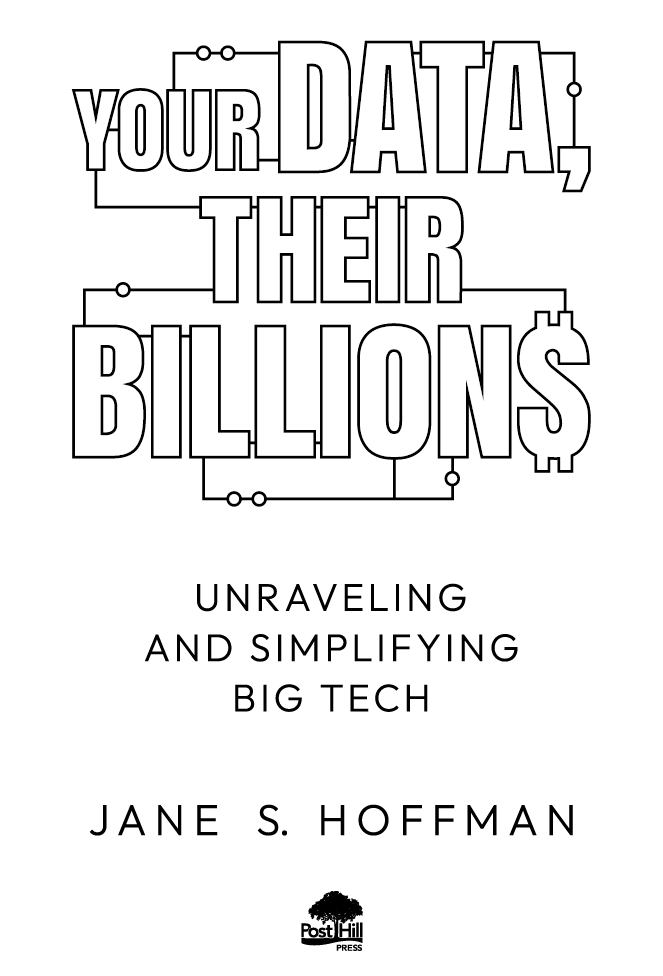
A POST HILL PRESS BOOK
ISBN: 978-1-63758-074-5
ISBN (eBook): 978-1-63758-075-2
Your Data, Their Billions:
Unraveling and Simplifying Big Tech
2022 by Jane S. Hoffman
All Rights Reserved
Cover Design by Cody Corcoran
No part of this book may be reproduced, stored in a retrieval system, or transmitted by any means without the written permission of the author and publisher.

Post Hill Press
New York Nashville
posthillpress.com
Published in the United States of America
For Michael.
Science and technology revolutionize our lives,
but memory, tradition and myth frame our response.
Arthur M. Schlesinger, American historian
Contents
Lunch. The midday meal. Whether were grabbing a sandwich from the local deli to eat at our desks, sitting down at a restaurant with a friend or a colleague, or running our kids to the drive-thru on the way to baseball practice, sometime around noon each day its going to occur to every single one of us to eat something. As a result of the pandemicliving, working, studying, trying to keep ourselves entertained within our own four walls for fifteen monthsa good many of us have taken to ordering food in by way of our laptops or an app on our smartphones and having it delivered to our homes or offices. Its convenient, its quick, and the menu options are nearly unlimited.
The other day, around twelve-fifteen, while I was working at my desk, I decided I wanted my favorite cashew chicken salad from one of my little neighborhood restaurants. So I got out my phone andas a very old television commercial about the convenience of the Yellow Pages once put itlet my fingers do the walking. What I was working on at my desk was this booka book about how our personal data is constantly being mined by, and turned into profit for, Big Tech, and what we can do about it. So I hope youll appreciate the irony when I tell you that the phone knew exactly what I was going to order and prompted me to confirm the delivery address almost as immediately as Id logged into the app.
I was reminded of a conversation Id had recently, as I prepared to write this book, with James Waldo, who is the Gordon McKay Professor of the Practice of Computer Science at Harvard. We were talking about Big Tech and the sort of targeted advertising they can do, thanks to the personal data we hand over in exchange for the convenience of shopping online. Jim told me about a mens clothing store, a brick-and-mortar place, now shuttered, in which he used to shop when he was in high school in Salt Lake City, Utah. How a particular clerk at this store always remembered his name and the items hed bought on his previous trips to the store, and invariably selected items that fit Jims needs and personal style. He remarked that when a real, live, human being treats us in this way, in-store, we think of it as exemplary customer service, but when a machine makes the same sort of suggestions, appropriate to our needs and our style, we think of it as invasive. I appreciate the differences, he said to me, but where do we cross the line on this? At what point in our retail experience does really good, human, customer service become algorithmic manipulation of our needs and desires? When does a highly personalized shopping experience become intrusive?
Thats one of the questions were going to attempt to answer within these pages. For myself, I found it unnerving that an inanimate objectmy phone knew what I wanted for lunch before I could tell it, and, importantly, it knew where I wanted lunch to be delivered . Part of our brave, new, algorithmic world is living with the fact that our machines come equipped with GPS and they know where we are nearly every second o f the day.
No real, live, human personnot even my husbandknows where I am every second of the day.
But my phone does.

Now, of course, it isnt my phone that knows so much about me. Its the Frightful FiveFacebook, Amazon, Apple, Microsoft, and Googlewho have this information. Who know so much more about me than just my affinity for cashew chicken salad.
And they almost certainly know at least that much about you , too.
Have you ever checked your blood pressure, or your heart rate after a workout, on your watch? Or perhaps opened an email to get your COVID-19 test results? Then you have given the Five all sorts of information about your health. Have you ever watched a movie on your phone while waiting in your doctors office, or carried a library on an iPad? Then you have provided the Five with valuable clues about your entertainment preferences. Have you ever shopped for groceries online or joined a private alumni group on social media? Then the Five have vital clues about the kind of diet you eat and your level of education. Do you have kids? Have you ever checked your childs test scores online? Or coordinated a play date by way of email? Or, perhaps, in the excitement of finding out you were going to have a child, you browsed on your laptop for a crib or other newborn necessities as soon as you got home from the OB-GYN? Then the Five know how many children you have, and what schools you send them toand thats why your social media feeds and your email inbox start filling up with ads for prenatal vitamins and diaper services before you have even had a chance to tell your family and friends the happy news.
It is from these and other various clues you feed into their algorithms that you, the human, become a set of data points the Five can sell to a company that wants to sell you the latest iteration of their exercise bike or tickets to the newest release from the Star Wars franchise, a bottle of the next best miracle diet pill or the hot new baby stroller. This constant exposure to targeted goods and services can foment desires you may never even have known you had. You might have, for example, been perfectly content with the Graco Trax Jogger Click Connect Jogging Stroller you could pick up from Walmart for $139, until you saw the ad for the Chicco Bravo Trio Single Travel System offered by Bed Bath & Beyond for $379.99the art of upselling, as perfected not by your friendly, local personal shopper, but by your not-so-local algorithm with a cold, dead, electromagnetic heart.
How completelyeven creepilycan a cold, soulless algorithm get to know all about you? In order to answer that question, I need you to take a little time-travel trip with me.
Were going back to the year 2012, to visit a Target store. For decades, Target, along with nearly every other large retailer in the world, has tried to collect as much information about its customers as possible. Target does it by assigning, or trying to assign, each customer who walks into a store or shops online a unique Guest ID number. That helps the store keep track of all the items that customer has purchased, as well as what credit cards theyve pay with, if theyve used a coupon, or when theyve visited the stores website, among other seemingly mundane shopping activities. But how do they use this information they collect? Well, they use it, for example, to send you coupon books in the mail or via email that offer discounts on items they know youve already purchasedsay, cleaning supplies when they know you might be running low on a certain productor that will direct your attention to other areas of their store. The coupons can be highly personalized for each shopper, so, for example, if you regularly buy window cleaner or air freshener at Target, they might send you coupons that will take you to their clothing or home goods or grocery department. The goal here is to expand the habit you already have of shopping for cleaning products at Target, and get you to buy tank tops and oven mitts and milk from them, too, while youre there anyway.
Next page
